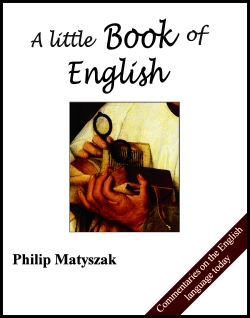|
The earlier Prof blog entries as well as some new articles are now available as a Kindle book from Amazon. We hope you enjoy it.

amazon.com amazon.co.uk
|
| 15 March 2020 | | The Learning Myth | 'I wish I had started learning English when I was a child – children learn languages so much faster.'
This is something that teachers often hear from mature EFL (English as a Foreign Language) students, and it reflects a common misconception. So let's try to clear this up.
First of all, kids are awesome at learning a language – their own language – because humans instinctively develop language the same way that cats automatically chase mice and birds learn international navigation. It's built into us. However, when it comes to learning a second language, kids are in reality far worse than adults.
One reason for this is because languages come with different grammatical sets, and kids learn grammar automatically. Learning two different sets simultaneously is both confusing and painful. And whereas an adult with a good grasp of grammar can say, 'Ah, in English adjectives do not change to agree with the noun, but in inflected languages they do', a child will say 'eh? Can I play Fortnite now?'
Even with learning a first versus learning a second language, I reckon I can get a motivated adult EFL student from zero to reasonably competent within three years. Now try that with a first language on a two-year-old before he is five. It's not just that adults can grasp more sophisticated concepts such as indirect objects, but also that adults, especially motivated adults, actually concentrate and study with a lot more discipline, and consciously apply what they have learned.
You will note that by and large, my argument (backed I should add, by a number of academic studies) indicates that the primary factor in learning a language is motivation rather than age. A child learns a first language very quickly because the child urgently needs to communicate. Once that communication has been achieved, the same child is reluctant to make the effort again unless it is really worthwhile. (Remember that language they tried to make you learn at school?)
An excellent example of the motivation hypothesis is a Chinese student I once had. His parents sent him to England for immersion studies in English, but the kid ended up being adopted by a bunch of Spanish students. At the end of the year he spoke mediocre English, but excellent Spanish. | | | | | 15 January 2020 | | Janus Words | As a language, English can be quite confusing. As proof of this, take another look at the previous sentence. Does 'quite confusing' mean 'rather confusing', or 'completely confusing'? Actually the sentence can have either meaning, because 'quite' belongs to that category of words that leave despairing language students sobbing into their textbooks – words that are their own opposites.
Consider 'left' which can mean 'departed' or 'remained', as in; 'When Fred and Bill had left, only Janet was left in the room'. Words like this are called Janus Words, from the Roman god of beginnings and endings, whose two faces look in opposite directions. Some of these words owe their ambiguity to the vagaries of British history. Thus the adjective 'fast' from old German means secure and immobile, as in expressions such as 'to hold fast' and 'fast asleep'. Then came the Vikings with their own interpretation of the word which meant 'vigorous, or speedy', so today we can have a car that could go fast were it not stuck fast in the mud.
Sometimes the word is derived from the relevant noun such as 'dust' which is why we dust a cookie by putting on icing sugar and dust the cake tin by taking the dust off. Likewise we stone a peach or plum by removing the stones, but primitive societies stone adulterers by vigorously adding stones.
Prepositions add a further layer of ambiguity. Should a town's water supply fail (give out) an aid agency might step in and supply (give out) that water. And if local doctors 'fight with' the city council to get extra hospital beds, are the doctors fighting against the city council , or are doctors and city council allies in a fight against the government?
Oddly enough, native speakers don't really consider Janus words a problem, whether they clip (together) papers or clip (off ) the tips of their fingernails. Generally, the meaning is clear from the context or tone, and occasionally from the grammar. (e.g. 'Left' means departed as a verb, but 'remain' when used as an adjective.) Nevertheless we can agree that this linguistic oversight needs sanctioning, if only we could agree whether 'oversight' means 'careful supervision' or 'lack of careful supervision' and 'sanctioning' means 'punishing' or 'giving permission'. | | | | | 15 November 2019 | | Lets discuss apostrophe's | Recently someone pointed out that while EFL teachers are familiar with things like the difference between gerunds and present participles and the use of the subjunctive in conditional clauses, regular English teachers battle with how to use basic items such as apostrophes.
Many of the previous generation will remember those funky, liberated English teachers of the 1970s for whom 'expressing yourself' was everything, and learning grammar merely put a straitjacket on little minds? Well some of their students have become teachers themselves, and as far as grammar is concerned many of these teachers still have those same uneducated 'little minds'.
They allow students to make basic errors such as apostrophizing plural's and using 'your' for 'you're', not because they have a freewheeling approach to grammar, but because they don't know any better themselves. Many of those teachers who do know better only know it because they taught grammar to themselves with precious little help from the system.
This has brought us to the present counsel of despair where some educators have argued for dropping apostrophes from the English language altogether, because 'no-one knows how to use them properly'. It's probably outrageously reactionary to suggest that perhaps it is the job of the education system to teach such things – starting with teaching the teachers.
As it is we are approaching a two-tier education system, where those who understand and use proper grammar include those foreigners who were taught in EFL classes, and a second group consisting of grammatical semi-literates who have been (mis)speaking their native language from infancy. | | | | | 15 September 2019 | | There's a word for that |
So, as an English-speaker are you any good at tmesis? And surely, you regularly practice aposiopesis, and you probably are inclined to liotes if you are a native English speaker. How about a bit of prosopopoeia every now and again?
One of the joys of the English language is that less than half of the vocabulary is understood by the average English user, and that user will probably use fewer than half of those words when speaking or writing. However, while not using any of the words in the preceding paragraph, we all use the forms of speech they describe. Consider tmesis - a word meaning to 'cut' (you probably know the noun derived from the opposite 'uncuttable' i.e. 'atom'.) With tmesis we cut a word or standard phrase to insert another word or phrase. For instance 'Jane know-it-all Smith was going on about the European boring Union all evening.' Tmesis often occurs in connection with politicians who might be referred to as (for example) Boris ****** Johnson.
Aposiopesis means 'silent' and it is when you can finish a sentence more eloquently by not finishing it and letting your listener fill in the blanks. Imagine for example a loan shark saying, 'I expect the money by the end of the month. Otherwise -'. Quite often we use aposiopesis with conditional clauses. 'There are sharks down there. If you jump in -'.
Liotes is that British habit which really annoys some foreigners. It is extreme understatement of the kind that infuriates a French chef who has cooked a superb meal only to be told by his English customer that it is 'not bad'. If a Briton describes something as 'a bit irritating' this means that he is on the brink of going berserk about it.
Finally prosopopoeia is simply evoking the presence of a third person to make a point. 'Do you talk to your mother with that kind of bad language?' 'All the other employees manage to get here on time'. 'If Mozart could hear modern pop music, he would spin in his grave.'
| | | | | 15 July 2019 | | The (circum)flexible vowel | Have you noticed that most of the alphabet is made of consonants, with only six letters for the vowels a,e,i,o and u? Let us leave aside the question of why these appear at random in the alphabet rather than in a special section at the beginning or the end. (And no, its not because of alphabetical order. The sequence of A-Z is completely random.)
Because there are only six letters given to vowels, we make them work extra hard. For a start, every vowel has a long and a short sound. This changes both the sound of the word and its meaning. Very often the longer sound is signalled by an 'e' at the end of the word which we don't pronounce. Instead that e changes the sound of the previous vowel. Consider 'hat' and 'hate', 'pet' and 'Pete', 'bit' and 'bite' and so on (you can do the others).
In many languages, the different pronunciation of sounds is signalled by diacritics (a word from ancient Greek meaning 'distinguishing'). These are the umlauts, graves, cedillas, macrons and other sentence embellishments that make using a keyboard in foreign languages something of an adventure, and a slower adventure at that.
Our ancestors clearly saw the need for simple, speedy typing in the future and avoided the whole diacritic issue by instead using combinations of vowels to give the extra sounds required by the spoken language. So we have double vowels which make 'bet' sound different from 'beet'. Note that 'tot' and 'toot' each give us a different 'o' sound from the 'o' in 'tote'.
Of course English vowels would not be English if they did not include some confusion and contradiction. So we have the 'ea' combination which sounds like 'ea' at the beginning of words like 'eat', 'each' and 'easy' but as 'ee' in the middle of words like 'beat' and 'heal'. Sometimes vowels are pronounced separately like the 'io' in 'radio' or as a single sound in words like 'point'.
Just to finish we should also note that vowels are the most subject of all sounds to changes by regional accents. So the word 'buck' becomes 'bark' in many parts of the USA, 'buhk' in southern England, and 'booke' in the north. | | | |
page 1 page 2 page 3 page 4 page 5 page 6 page 7 page 8 page 9 page 10 page 11 page 12 page 13 page 14 page 15 page 16 page 17 |
|
|

